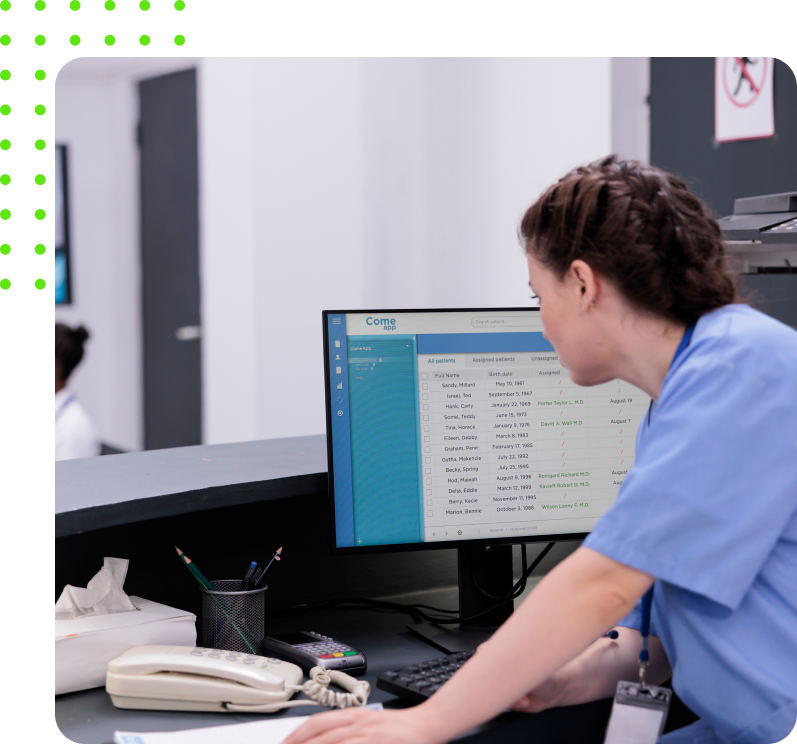Urgent Care Billing Services
Urgent care centers fill the gap between primary care and emergency rooms by providing walk-in care. But handling billing for these services can be a hassle for both patients and providers.

About Ohio's Best Urgent Care Billing Company
Urgent care facilities provide prompt and appropriate treatment of unscheduled ambulatory patients. These need to handle a huge patient volume without compromising the quality. Med Alliance has handled unique needs for over 20 years and has working relationships with over 50 urgent care centers.
You can count on our billing experts for:
- Medicare, Medicaid, and HIPAA compliance.
- Correct application of CPT and ICD codes in the process of certified coders.
- Accurate compliance reduces the possibility of expensive audits.
- With the right understanding of the payers' requirements submission becomes accurate.
Revenue Cycle Management Services for Urgent Care Centers
Patient registration and verification
The patient data should be validated in walk-in clinics to avoid the risk of delaying the claim.
Medical Coding for Urgent Care
S-codes and E/M levels are used directly in the right attention situations.
Claims Filing and Tracking
It ensures timely processing of claims for payments and prevents gaps in payments.
Denial and Rejection Management
Handle those claims with proper follow-ups that would recover some lost revenue.
Posting and Reconciliations
Accurate payment records help in keeping clear financial records.
Tailored Reporting and Analytics
Develop actionable insights that help build financial performance.
Compliance and Audit Support
Adherence to regulatory requirements would avoid penalties.
Why Choose Us for Urgent Care Billing Services?
20+ Years of proven urgent care billing expertise
Certified coders for precise claim processing
24/7 Dedicated revenue cycle management support
HIPAA-Compliant billing processes for 50+ urgent care centres
Track record of boosting revenue by 20% for clients
Customized solutions for every urgent care facility

Benefits of Outsourcing Urgent Care Revenue Cycle Management Services
Cut the administrative hassle by 40%
We take care of the back end with on-site diagnostics to minor treatment for injury, while you're out front.
Free EHR Integration
With our free EHR, enjoy safe and efficient access to patient records interoperable with your scheduling and lab testing.
24/7 Personalized Support
Questions and concerns? Round-the-clock availability of dedicated account managers and our customer support will be more than happy to cater to you.
Instant Eligibility Verification
Verify patient coverage in seconds, reducing surprises and collecting payments upfront, leading to fewer billing issues.
Increased revenue by 25%
We help maximize revenues without adding to your workload by streamlining processes and proactively managing claims.
FAQS
Urgent care billing handles claims, coding, and collections for revenues based on services rendered at the urgent care level. These include walk-in visits, rapid treatment, and special codes in order to ensure claims can be submitted and paid, using S-codes and E/M levels.
Since urgent care billing outsourcing transfers claims, coding, and collections management to experts, time and mistakes are saved. This makes cash flow smoother, denials fewer, and therefore, those administrative burdens it brings with providers focusing their efforts on patients.
The new guidelines will be updated by including ICD-10 and CPT to ensure proper coding of all services, even when documentation and cross-checking claims are done at the verification process, by experienced coders.
Sure, they trace denied claims; they identify problems and send them back effectively. Yes, this really contributes to reviving revenue and helps in controlling denial rates over a period.
They cut the operational costs through the effective handling of billing work. The write-offs are reduced while approval chances for claims rise; hence, gross revenues also go up. Therefore, the urgent care centers can enjoy cost-effectiveness.
Look for a billing partner with experience in urgent care, which has certified coders, fees that are transparent, and a proven track record. Compliance with HIPAA and their capability to meet your needs including coding, claims, and reporting should also be reviewed.
You can get detailed reports on claim statuses, denial rates, collections, and accounts receivable. These reports provide insights into your practice’s financial health and help improve revenue cycle management.
Most urgent care billing services align well with EHRs, allowing for the streamlining of workflow with accuracy of data sharing, faster claims processing, and efficiency.
Most probably, better cash flow and lower denial would have been witnessed within 30-60 days with the implementation of a professional billing service. Mostly, it's the timeline which depends on claims volume and effectiveness of that service.